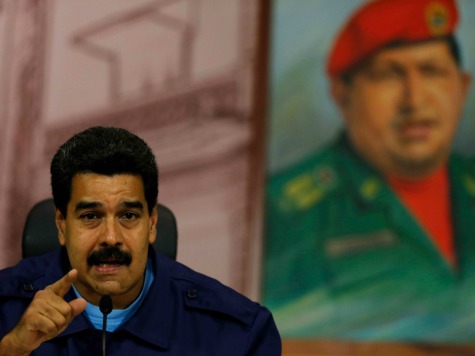The head of the Venezuelan Catholic Church issued a stern statement against the violent government of President Nicolás Maduro. He rejected “the criminalization of protest” and called for an end to “the abusive repression and judicial persecution” of political dissidents.
Monsignor Diego Padron, the president of the Episcopal Conference of Venezuela, led a press conference Wednesday condemning Maduro’s government for “torture,” “persecution,” and “restriction of information.” In a call to “all Venezuelans, regardless of political sympathies,” Monsignor Padron declared that the “fundamental cause of the current crisis” in the country was Maduro’s continued attempt to implement what Hugo Chávez called the “Plan of the Nation.” That plan was a Great Leap Forward-style economic, political, and social strategy to create the ideal “Bolivarian Socialism of the Twenty-First Century.”
This plan, Padron argued, “obscured the promotion of a system of government with totalitarian tendencies, which puts in doubt its democratic profile.” Chavismo, Padron continued, necessitated “the brutal repression of political dissidents” and their “pacification or appeasement by way of threats, verbal violence or physical repression.” The Church, he declared, adamantly condemns that mode of operation.
“We reject the criminalization of protest. … We denounce the abusive repression and judicial persecution of mayors in disagreement with the government,” Padron told the press, adding that protesters are “exercising their legitimate right, as per the Constitution, to protest, and thus demand respect.” He warned against the murder of unarmed protesters and reminded those in power that “the value of life is absolute, and God protects it with the Fifth Commandment.”
Padron demanded a more expansive freedom of the press and an end to “attempts against the right of the people to be well-informed.” State-sponsored television only runs the opinions of those allied to Maduro, and former opposition television network Globovision was sold last year to allies of the government. It currently boasts only one story on its front page about the food shortages in the country: “Supermarket Lines ‘Demonstrate the Acquisition Power of the People,’ According to Mercal Spokesman.”
Chavismo has always had a tense relationship with the Catholic Church. During his tenure, Chávez himself declared members of the Church “liars and perverts” after the Church condemned his attempts to reform the legislature behind closed doors.
Last month, Pope Francis called for “reconciliation through mutual forgiveness and sincere dialogue,” imploring the government to take the first step in abandoning violence.
The Catholic Church’s condemnation of the government comes at a pivotal time for the nation; after years of oppression and months of incessant protest, the international political community has begun to pay attention. The oppressive acts under Maduro have become increasingly high-profile, with the Venezuelan president beginning the week attacking an illegally ousted opposition congresswoman and her supporters with tear gas. Maduro followed the attack with a column in The New York Times in which he accused the protesters of violence. The death toll of the recent wave of protests currently stands at 39, with reports indicating that one unarmed protester is arrested every half hour.
Watch the statement from the Episcopal Conference of Venezuela (in Spanish) below:

COMMENTS
Please let us know if you're having issues with commenting.